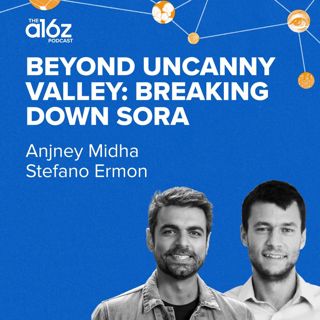
Come for the Games, Stay for the Party
The games industry is in the midst of a tectonic shift. Powered by platform convergence, games-as-a-service, and user-generated content, modern video games—what we call next-generation games—are unlike anything we've seen before. In the past decade, gaming has grown from a niche hobby into a global, culture-defining phenomenon.Not only are the games themselves becoming increasingly immersive, the way we develop and discover them has fundamentally changed. In contrast to the hits-driven business model of the past, now games are shaped in real time by player feedback. And thanks to the rise of influencer gamers, the experience of finding new games has become organic and social.In this episode, a16z general partner Andrew Chen, deal partner Jon Lai, and host Lauren Murrow discuss how gaming is dominating not only the entertainment industry, but also pop culture at large. (Why can't we quit you, Untitled Goose Game?!) Andrew and Jon share how they think about emerging technologies in the space, as well as the features they look for in next-gen games and game developers.
2 Nov 201922min

AI in B2B
Consumer software may have adopted and incorporated AI ahead of enterprise software, where the data is more proprietary, and the market is a few thousand companies not hundreds of millions of smartphone users. But recently AI has found its way into B2B, and it is rapidly transforming how we work and the software we use, across all industries and organizational functions. In this episode, Das Rush interviews Oleg Rogynskyy, founder of People.ai, an AI platform for sales and marketers, and Peter Lauten from the a16z Enterprise investing team about what the rise AI in B2B means for enterprises, workers, and startups. They explain why AI provides a strong first mover advantage to enterprises that adopt it early; how it can automate lower level tasks, maximize our focus, and, ultimately, make our work more meaningful; and for startups, they provide a playbook for seizing the next AI opportunity.
24 Okt 201924min

Free Software and Open Source Business
Today, despite the critical importance of open source to software, it’s still seen by some as blasphemous to make money as an open source business. In this podcast, Armon Dadgar, Cofounder and CTO of HashiCorp; Ali Ghodsi, CEO of Databricks; and a16z General Partner Peter Levine explain why it's necessary to turn some open source projects into businesses.They also cover the most important questions for open source leaders to answer: How do you keep community engaged while building a business? What new opportunities does SaaS (software-as-a-service) present? And if you are a SaaS business, how should you approach cloud service companies, like Amazon Web Services (AWS)?
21 Okt 201935min

Of Emojis and Innovation
This rerun podcast (first recorded in 2015, now being rerun as one of our evergreen classics/ favorites) -- is ALL about emoji. But it's really about how innovation really comes about: through the tension between open standards vs. closed/ proprietary systems; the politics of time and place; and the economics of creativity, from making to funding.So yes, this podcast is all about emoji. But it's also about where emoji fits in the taxonomy of social communication, and why that matters -- from making emotions machine-readable to being able to add "limbic" visual expression to our world of text. And if emoji is a language, why can't we translate it; why so ambiguous?? How do emojis work, both technically underneath the hood... and in the (committee) Room Where It Happens?Joining this episode are former VP of Data at Kickstarter Fred Benenson (and the man behind 'Emoji Dick'); and former New York Times reporter and current Unicode Emoji subcommittee vice-chair, Jennifer 8. Lee (and one of the women behind the dumpling emoji) -- in conversation with Sonal Chokshi.image: Yiying Lu (@yiyinglu)
15 Okt 201938min

The Environment, Capitalism, Technology
It used to be that the only way for humanity to grow -- and progress -- was through destroying the environment. Sure, the Industrial Revolution brought about the growth of our economies, our population, our prosperity; but it also led to our extracting more resources from the planet, more pollution, and some nightmarish human conditions as well. But is this interplay between the two -- of human growth vs. environment, of protection vs. destruction -- really a zero-sum game? Even if it were true in history, is it true today? How about for developing economies around the world today -- do they have to go through an extractive phase first before entering a protective one... or can they skip that phase altogether through better technology (the way they leapt to mobile)?And if capitalism is not responsible for environmental degradation, than who or what is? Where does technology come in, and where doesn't it -- if you believe we already have the answers to saving the environment? Marc Andreessen and Sonal Chokshi interview MIT economist Andrew McAfee about all this and more, given his new book, More from Less: The Surprising Story of How We Learned to Prosper Using Fewer Resources -- and What Happens Next.So what does happen next? From nuclear power to dematerialization to Tesla and the next cleantech revolution (or not), this episode of the a16z Podcast brings a different perspective to an important discussion around taking care of our planet... and also ensuring human progress through the spread of human capital and technology. image: Kevin Gill / Flickr
4 Okt 201946min

16 Minutes on the News #10: Amazon Healthcare, Oculus VR/AR, Google Quantum Supremacy?
Our news podcast, 16 Minutes -- where we quickly cover the top headlines of the week, the a16z way (why are these topics in the news; what's real, what's hype from our vantage point of tech trends) -- is now only available as its own show feed, separately from the main a16z Podcast... so be sure to subscribe wherever you get your podcasts if you want our weekly news & tech take!This is the tenth episode of the show, and this week we cover a variety of topics with the following a16z experts:Amazon Care healthcare news this week that they're now providing a virtual medical clinic for employees, initially in Seattle, using telemedicine and in-home visits; what does their delivering healthcare actually mean for both incumbents and startups... and the future of medicine? -- with Julie Yoo and Jorge CondeOculus Connect 6, Facebook's annual developer event, where there were a number of announcements about devices, content, and more that could be key to the evolution of virtual reality (VR) and augmented reality (AR) -- with Chris DixonGoogle quantum supremacy claim, as shared in a paper with/via NASA; what's fact, what's fiction about it; what does it actually mean (or not mean) for cryptography and other applications; and where are we, really, in quantum computing? -- with Vijay Pande...hosted by Sonal Chokshi.---The views expressed here are those of the individual AH Capital Management, L.L.C. (“a16z”) personnel quoted and are not the views of a16z or its affiliates. Certain information contained in here has been obtained from third-party sources, including from portfolio companies of funds managed by a16z. While taken from sources believed to be reliable, a16z has not independently verified such information and makes no representations about the enduring accuracy of the information or its appropriateness for a given situation.This content is provided for informational purposes only, and should not be relied upon as legal, business, investment, or tax advice. You should consult your own advisers as to those matters. References to any securities or digital assets are for illustrative purposes only, and do not constitute an investment recommendation or offer to provide investment advisory services. Furthermore, this content is not directed at nor intended for use by any investors or prospective investors, and may not under any circumstances be relied upon when making a decision to invest in any fund managed by a16z. (An offering to invest in an a16z fund will be made only by the private placement memorandum, subscription agreement, and other relevant documentation of any such fund and should be read in their entirety.) Any investments or portfolio companies mentioned, referred to, or described are not representative of all investments in vehicles managed by a16z, and there can be no assurance that the investments will be profitable or that other investments made in the future will have similar characteristics or results. A list of investments made by funds managed by Andreessen Horowitz (excluding investments for which the issuer has not provided permission for a16z to disclose publicly as well as unannounced investments in publicly traded digital assets) is available at https://a16z.com/investments/.Charts and graphs provided within are for informational purposes solely and should not be relied upon when making any investment decision. Past performance is not indicative of future results. The content speaks only as of the date indicated. Any projections, estimates, forecasts, targets, prospects, and/or opinions expressed in these materials are subject to change without notice and may differ or be contrary to opinions expressed by others. Please see https://a16z.com/disclosures for additional important information.
30 Sep 201922min

New Business Models for Gaming, Collaboration, Creativity
The combination of cloud, social, and mobile took gaming beyond a small base of just console- and PC-gamers to a massive player base. But the underlying business model -- the concept of "free-to-play", built on top of games-as-a-service -- may have been the real innovation that led us to the global gaming phenomenons we have today.Unfortunately, observes gaming veteran Kevin Chou -- who's seen it all when it comes to tech platform shifts and gaming as a longtime gamer, founding CEO of Kabam, and now founder and CEO of Forte -- there is "a dark side" to free-to-play: Game developers have to balance the gamers who aren't paying with those who are, and especially those who are paying a helluva lot more (the whales) in order to make money and keep the game going. This balance becomes incredibly challenging over time; it is, quite frankly, a lopsided economy. The players will leave: The incentives between game publishers and players are simply not aligned.Yet what if we could re-align those incentives -- really, the economic relationships -- between game publishers/developers; players and guilds and clans; those who create on top of games (like on Roblox and Minecraft); those who trade and otherwise transact both inside and outside games (it's already happening in secondary markets and gold farms). We could do this in a more balanced way, thanks to blockchain technology and cryptoeconomic business models -- leading to thriving gaming economies with better monetization and deeper engagement, as well as new forms of collaboration, community, and creativity.But smart contracts, cryptoeconomies, security, etc. is hard for gamers who just want to focus on designing the best game, so how do we get here? Chou shares his thoughts in this episode of the a16z Podcast with Sonal Chokshi and general partner Chris Dixon. In gaming (and in fact, with other tech trends too), innovation happens when there's a combination of new devices, new technology platforms, and new delivery mechanisms... but it's the business-model innovations, argues Dixon, that tend to create the most startup opportunities.image: battle scene from Eve Online, a game with an economy (via Forte.io)---The views expressed here are those of the individual AH Capital Management, L.L.C. (“a16z”) personnel quoted and are not the views of a16z or its affiliates. Certain information contained in here has been obtained from third-party sources, including from portfolio companies of funds managed by a16z. While taken from sources believed to be reliable, a16z has not independently verified such information and makes no representations about the enduring accuracy of the information or its appropriateness for a given situation.This content is provided for informational purposes only, and should not be relied upon as legal, business, investment, or tax advice. You should consult your own advisers as to those matters. References to any securities or digital assets are for illustrative purposes only, and do not constitute an investment recommendation or offer to provide investment advisory services. Furthermore, this content is not directed at nor intended for use by any investors or prospective investors, and may not under any circumstances be relied upon when making a decision to invest in any fund managed by a16z. (An offering to invest in an a16z fund will be made only by the private placement memorandum, subscription agreement, and other relevant documentation of any such fund and should be read in their entirety.) Any investments or portfolio companies mentioned, referred to, or described are not representative of all investments in vehicles managed by a16z, and there can be no assurance that the investments will be profitable or that other investments made in the future will have similar characteristics or results. A list of investments made by funds managed by Andreessen Horowitz (excluding investments for which the issuer has not provided permission for a16z to disclose publicly as well as unannounced investments in publicly traded digital assets) is available at https://a16z.com/investments/.Charts and graphs provided within are for informational purposes solely and should not be relied upon when making any investment decision. Past performance is not indicative of future results. The content speaks only as of the date indicated. Any projections, estimates, forecasts, targets, prospects, and/or opinions expressed in these materials are subject to change without notice and may differ or be contrary to opinions expressed by others. Please see https://a16z.com/disclosures for additional important information.
28 Sep 201942min

16 Minutes on the News #9: All the Recent Phone Hacks
This is episode #9 of our news show, 16 Minutes, where we quickly cover recent headlines of the week, the a16z way -- why they’re in the news; why they matter from our vantage point in tech -- and share our experts’ views on the trends involved.This week we do a short but deep dive to tease apart the FUD from the facts on all the phone hacks of late (also, arguably, one of the worst years on record for certain device manufacturers) -- given the following news:Just this week, the FBI’s Cyber Division released a notification to private industry on “Cyber Criminals Use Social Engineering and Technical Attacks to Circumvent Multi-Factor Authentication”;Last week, a telecom security firm reported a vulnerability called “Simjacker” where SMS containing spyware-like code "takes over" a phone's SIM card in order to retrieve and perform sensitive commands, regardless of platform or device;Over the past month, Google and Apple have been going back and forth over a post the former released, “A very deep dive into iOS Exploit chains found in the wild”, where a small collection of hacked websites were using iPhone zero-day vulnerabilities to target China's Uyghur Muslim community (though Google is not the one who revealed the specific websites, Apple did confirm it in their response a week later) -- what do we make of this exchange; of the fact that zero-day hacks are now more expensive on Android than on Apple; and of Apple's ethos when it comes to a third-party ecosystem for security?Finally, how should we think about phone authentication overall when it comes to security, and what can we do to secure ourselves? Our a16z experts -- general partner Martin Casado and former chief security officer/ operating partner for security Joel de la Garza -- share their thoughts on all this and more with host Sonal Chokshi, in this episode of 16 Minutes.---The views expressed here are those of the individual AH Capital Management, L.L.C. (“a16z”) personnel quoted and are not the views of a16z or its affiliates. Certain information contained in here has been obtained from third-party sources, including from portfolio companies of funds managed by a16z. While taken from sources believed to be reliable, a16z has not independently verified such information and makes no representations about the enduring accuracy of the information or its appropriateness for a given situation.This content is provided for informational purposes only, and should not be relied upon as legal, business, investment, or tax advice. You should consult your own advisers as to those matters. References to any securities or digital assets are for illustrative purposes only, and do not constitute an investment recommendation or offer to provide investment advisory services. Furthermore, this content is not directed at nor intended for use by any investors or prospective investors, and may not under any circumstances be relied upon when making a decision to invest in any fund managed by a16z. (An offering to invest in an a16z fund will be made only by the private placement memorandum, subscription agreement, and other relevant documentation of any such fund and should be read in their entirety.) Any investments or portfolio companies mentioned, referred to, or described are not representative of all investments in vehicles managed by a16z, and there can be no assurance that the investments will be profitable or that other investments made in the future will have similar characteristics or results. A list of investments made by funds managed by Andreessen Horowitz (excluding investments for which the issuer has not provided permission for a16z to disclose publicly as well as unannounced investments in publicly traded digital assets) is available at a16z.com/investments.Charts and graphs provided within are for informational purposes solely and should not be relied upon when making any investment decision. Past performance is not indicative of future results. The content speaks only as of the date indicated. Any projections, estimates, forecasts, targets, prospects, and/or opinions expressed in these materials are subject to change without notice and may differ or be contrary to opinions expressed by others. Please see a16z.com/disclosures for additional important information.
23 Sep 201919min






















